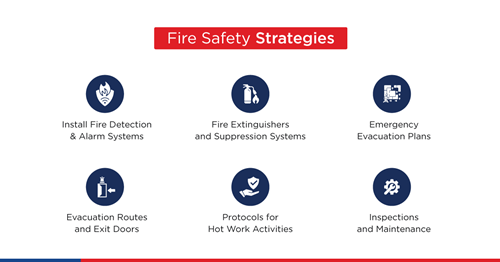Safeguarding Against Fire Hazards: Why Workplace Fire Safety Matters?
Fire safety concerns in the workplace demand the utmost importance due to the potentially catastrophic consequences they entail. Not only is it a moral obligation to ensure the safety of employees, but failure to address fire safety risks can also lead to legal and regulatory repercussions, including penalties.
Let’s take a look at the importance of fire safety and why it's crucial to prioritise it in all workplace environments. By understanding its significance and potential risks, we can take steps to ensure the safety of everyone who works in those places.
Importance of Fire Safety at the Workplace
From 2017 to 2020, India witnessed an average of three fatalities and 11 injuries daily in factories, as per data obtained from the Ministry of Labour & Employment Directorate General Factory Advice Service & Labour Institutes (DGFASLI). Ignoring fire safety concerns in the workplace can lead to severe consequences, including risks to human life, financial losses, and legal liabilities due to non-compliance with regulations.
Legal and Regulatory Compliance
Compliance with fire safety regulations is not just a matter of ticking boxes—it's a legal requirement. Authorities enforce stringent regulations to ensure that workplaces adhere to specific standards aimed at preventing and mitigating fire hazards. Therefore, it is imperative for businesses to prioritise fire safety and invest in measures to meet regulatory requirements. In India, fire safety regulations are governed primarily by the following laws and regulations:
- Factories Act, 1948: Mandates fire safety measures in factories, including fire prevention systems and evacuation plans.
- Maharashtra Fire Prevention and Life Safety Measures Act, 2006: Requires fire safety standards in buildings within Maharashtra, including fire safety certificates.
- National Building Code of India (NBC): Sets fire safety standards for buildings nationwide, covering materials and safety systems.
- State Fire Services Acts: Enacted by some states to regulate fire prevention, equipment licensing, and emergency procedures.
- Indian Penal Code (IPC): Addresses fire-related offences, such as mischief and negligence endangering lives.
Identification Of Potential Hazards And Triggers

Here are some common hazards and triggers to be aware of:
Electrical Hazards: These include different scenarios that can lead to potential fire breaks, including overloaded circuits, damaged wiring, and malfunctioning electrical equipment.
Combustible Materials: Improper storage or handling of flammable liquids, gases, and other materials, especially with the risk of coming into contact with ignition sources.
Heating Systems: Malfunctioning heating equipment or blocked vents can cause overheating and ignition of nearby combustible materials.
Cooking Facilities: Grease buildup, unattended cooking equipment, and inadequate ventilation in commercial kitchens can lead to fires.
Smoking: Smoking in prohibited areas or improper disposal of smoking materials can ignite combustible materials or create fire hazards.
Hot Work Activities: Welding, soldering, and cutting operations pose a risk to safety and must be addressed with proper precautions, permits and fire watches.
Poor Housekeeping: Accumulation of clutter and debris obstructs fire exits, and emergency equipment increases the risk of ignition from combustible materials.
Training and Awareness
Promoting fire safety training and awareness is crucial for ensuring the safety and well-being of employees and customers in any workplace. Here are some of the key suggestions for improving fire safety training and awareness.
- Provide training on how to respond effectively in the event of a fire
- Conduct regular fire drills to practise emergency procedures
- Offer fire safety workshops or seminars to enhance knowledge and skills
- Distribute informational materials such as posters or brochures to reinforce key safety messages
- Foster a culture of fire safety awareness to empower employees
- Encourage employees to identify potential risks and take proactive measures to prevent fires
- Ensure compliance with regulatory requirements by promoting fire safety training.
How Do We Implement Fire Safety Strategies?

Some key strategies to implement effective fire safety control include:
Installing and Maintaining Alarm Systems: Ensure that fire detection systems, including smoke detectors and fire alarms, are installed throughout the facility and regularly tested and maintained.
Provide Adequate Fire Extinguishers and Suppression Systems: Equip the facility with the appropriate types and quantities of fire extinguishers and automatic suppression systems, such as sprinklers, and ensure they are properly maintained and accessible for use in the event of a fire.
Develop and Implement Emergency Evacuation Plans: Create detailed evacuation plans that outline routes, assembly points, and procedures for individuals with disabilities, and conduct regular fire drills to familiarise occupants with emergency procedures.
Maintain Clear Evacuation Routes and Exit Doors: Keep evacuation routes clear of obstructions and ensure that exit doors are clearly marked, easily identifiable, and operable.
Implement Fire Safety Training for Employees: Provide comprehensive fire safety training to employees, covering fire prevention, emergency procedures, and proper use of fire extinguishers, and conduct regular refresher training sessions to reinforce knowledge and skills.
Establish Protocols: Develop strict protocols for hot work activities to minimise the risk of igniting combustible materials, including requiring permits, conducting pre-work inspections, and providing fire watch personnel to monitor activities.
Conclusion: Fire Safety Helps Protecting Lives
In today’s modern organisations and workspaces, fire safety cannot be an afterthought. It is imperative that businesses take necessary actions to ensure the utmost fire safety at the workplace. From identifying hazards to implementing effective strategies, businesses can create a safe and thriving environment for their employees. It's not just a legal obligation but a moral imperative to ensure the well-being of everyone in the workplace.
At the British Safety Council, our commitment towards ensuring the safety and well-being of people in their workplace. In this journey, it is crucial for us to work together to foster a healthy work atmosphere. Our flagship product - "Five Star Audits” is the support you need. These audits adhere rigorously to globally recognised standards, ensuring consistent compliance with stringent health and safety measures. Our extensive suite covers audits on Environmental Sustainability, Occupational Health and Safety, Process Safety, and more. With our esteemed reputation and dedication to upholding safety standards, we strive to foster a transformative safety culture across organisations.

